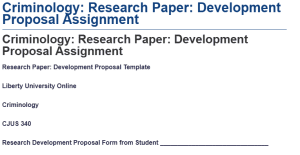Criminology: Research Paper: Development Proposal Assignment
Research Paper: Development Proposal Template
Liberty University Online
Criminology
CJUS 340
Research Development Proposal Form from Student _______________________________
Type Research Hypothesis Here:
Community service as punishment for crimes is not an effective deterrent from committing crime in the future, as compared to imprisonment.
Why This Is Important:
The practice of community service has emerged as part of the justice system, in which community service is used as an alternative to jail time in resolving minor crimes. The practice was first developed in Western Europe before being adopted throughout the rest of the world, reflecting the shift toward restorative justice practices. According to Cullen et al. (2017), community service is based on the belief that offenders, especially non-violent or low-level criminals, can pay their debt to society through constructive work rather than retribution by imprisonment. The attractiveness of community service lies in the thought that community service serves the needs of offenders and society alike. For example, it allows offenders to avoid the shame of a criminal conviction or imprisonment, reintegrate into the community without difficulty after committing a crime, and reduce the likelihood of further offending. Community service is also viewed as an economic punishment from the broader community perspective because it does not have the intensive investment required by imprisonment and can have an identifiable, beneficial impact on community needs such as access to labor for community projects such as cleaning and environmental conservation. However, there are debates on the effectiveness of community service in deterrence. Critics consider it too soft without the “hard punishment” aspect in traditional incarceration. Others argue that, although community service might have a rehabilitative function, it does not fulfill the deterrent function needed in the prevention of future offenses. This points to the need for more research on the effectiveness of community service in preventing crime.
Studying the effectiveness of using community service as a criminal deterrent is essential in formulating a policy for criminal justice, as community service may be considered an approach to punishment that is humane and less costly than imprisonment. Research on the use of community service is also essential in understanding how community service aligns with the deterrence theory in the justice system. As stated by Lee (2017), deterrence theory presupposes that punishments must be severe, certain, and swift enough not to reoffend. Therefore, it is important to examine the effectiveness of community service based on the severity, certainty, and swiftness of different types of community service. Exploring the effectiveness of community service in crime deterrence is also vital because it can help make a compelling argument on how community service can be used to prevent overcrowding in prisons without increasing the crime rate. For example, community service could serve as a middle ground between detention and complete freedom, provided it is effective.
Although various studies have explored the use of community service in crime prevention, there are limited studies on its effectiveness in crime deterrence. Therefore, the proposed research will fill this gap by analyzing whether community service reduces recidivism more than other punitive alternatives. The research also aims to shed light on whether policymakers should continue using community service as a criminal penalty in its present form, modify it, or supplement it so that it will align with goals of deterrence, rehabilitation, and cost-effectiveness. Understanding the actual impact of community service on offenders can also place criminal justice policymakers in a better position to devise a sentence that best meets the interests of long-term public safety and the effective reintegration of the offenders.
References
Cullen, F. T., Jonson, C. L., & Mears, D. P. (2017). Reinventing community corrections. Crime and Justice, 46(1), 27–93. https://doi.org/10.1086/688457
Lee, H.-W. (2017). Taking deterrence seriously: The wide-scope deterrence theory of punishment. Criminal Justice Ethics, 36(1), 2–24. https://doi.org/10.1080/0731129x.2017.1298879
ORDER A PLAGIARISM-FREE PAPER HERE
We’ll write everything from scratch
Question
Research Paper: Development Proposal Assignment

Criminology: Research Paper: Development Proposal Assignment
Instructions
- The proposal must be a maximum of 2 pages and a minimum of a short paragraph if the concept is well-defined.
- Your proposal must set forth the question to be examined.
- The proposal must be submitted using the template provided. (Research Paper: Development Proposal Template).
- Develop a hypothesis based on your initial research of your topic.
- Follow the format and the prompts on the template.

